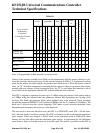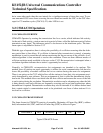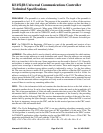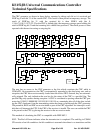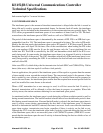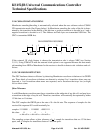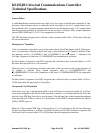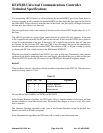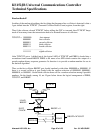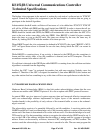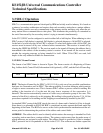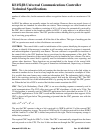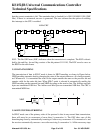
KS152JB Universal Communications Controller
Technical Specifications
Kawasaki LSI USA, Inc. Page 44 of 120 Ver. 0.9 KS152JB2
If a transmitting 8XC152 detects a collision during the preamble/BOF part of the frame that it is
trying to transmit, it will complete the preamble/BOF and then begin the jam signal in the first bit
time after BOF. If the collision is detected later in the frame., the jam signal will begin in the next
bit time after the collision was detected.
The jam signal lasts for the same number of bit times as the selected CRC length-either 16- or 32-
bit times.
The 8XC152 provides two types of jam signals that can be selected by user software. If the node
is DC-coupled to the network, the DC jam can be selected. In this case the GTXD pin is pulled to
a logic 0 for the duration of the jam. If the node is AC-coupled to the network, then AC jam must
be selected. In this case the GSC takes the CRC it has calculated thus far in the transmission,
inverts each bit, and transmits the inverted CRC.The selection of DC or AC jam is made by setting
or clearing the DCJ bit, which resides in the SFR named MYSLOT.
When the jam signal is completed, the 8XC152 goes into an idle state. Presumably, other stations
on the network are also generating their own jam signals, after which they too go into an idle state.
When the 8XC152 detects the idle state at its own GRXD pin, the backoff sequence begins.
Backoff
There are three software selectable collision resolution algorithms in the 8XC152. The selection is
made by writing values to 3 bits:
M1 and M0 reside in GMOD, and DCR is in MYSLOT.
In the Normal Random algorithm, the GSC backs off for a random number of slot times and then
decides whether to restart the transmission. The backoff time begins as soon as a line idle condi-
tion is detected.
The Alternate Random algorithm is the same as the Normal Random except the backoff time
doesn’t start until an IFS has transpired.
In the Deterministic algorithm, the GSC backs off to await its pre-determined turn.
Table 12:
DCR M1 M0 Algorithm
0 0 0
0 1 1
1 1 1
Normal Random
Alternate Random
Deterministic



